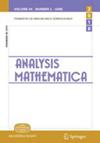\(L_p\rightarrow L_q\) boundedness of Fourier multipliers
IF 0.5
3区 数学
Q3 MATHEMATICS
引用次数: 0
Abstract
This paper explores the boundedness of Fourier multipliers from \(L_p\) to \(L_q\). We present new results that improve upon classical theorems due to Hörmander, Lizorkin, and Marcinkiewicz. In addition, we provide necessary conditions for the boundedness of Fourier multipliers. We introduce the concept of \(M\)-generalized monotone functions and sequences and derive criteria for the boundedness of Fourier multipliers corresponding to them.
\(L_p\rightarrow L_q\) 傅里叶乘数的有界性
本文探讨了从\(L_p\)到\(L_q\)的傅里叶乘子的有界性。我们提出了新的结果,改进了由Hörmander、Lizorkin和Marcinkiewicz提出的经典定理。此外,给出了傅里叶乘子有界性的必要条件。引入\(M\) -广义单调函数和序列的概念,并推导出与之相对应的傅里叶乘子的有界性准则。
本文章由计算机程序翻译,如有差异,请以英文原文为准。
求助全文
约1分钟内获得全文
求助全文
来源期刊

Analysis Mathematica
MATHEMATICS-
CiteScore
1.00
自引率
14.30%
发文量
54
审稿时长
>12 weeks
期刊介绍:
Traditionally the emphasis of Analysis Mathematica is classical analysis, including real functions (MSC 2010: 26xx), measure and integration (28xx), functions of a complex variable (30xx), special functions (33xx), sequences, series, summability (40xx), approximations and expansions (41xx).
The scope also includes potential theory (31xx), several complex variables and analytic spaces (32xx), harmonic analysis on Euclidean spaces (42xx), abstract harmonic analysis (43xx).
The journal willingly considers papers in difference and functional equations (39xx), functional analysis (46xx), operator theory (47xx), analysis on topological groups and metric spaces, matrix analysis, discrete versions of topics in analysis, convex and geometric analysis and the interplay between geometry and analysis.
 求助内容:
求助内容: 应助结果提醒方式:
应助结果提醒方式:


